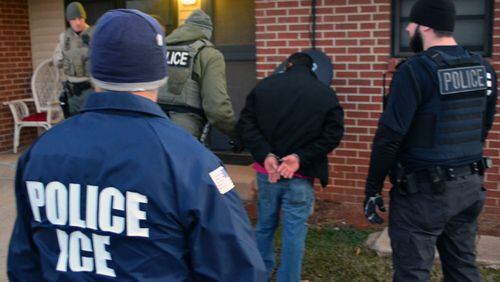U.S. Homeland Security Secretary John Kelly has drafted a sweeping set of new guidelines that would expand the nation’s immigration detention system and expose many more unauthorized immigrants to deportation.
Included in a pair of memos the retired Marine Corps general signed Friday, the guidelines are aimed at implementing President Donald Trump’s executive orders for getting tough on illegal immigration. The memos — which have not been released publicly yet — are addressed to the heads of U.S. Immigration and Customs Enforcement, U.S. Citizenship and Immigration Services and U.S. Customs and Border Protection.
RELATED: Georgia woman swept up in immigration raid says she’s a U.S. citizen
“The surge of illegal immigration at the southern border has overwhelmed federal agencies and resources and has created a significant national security vulnerability to the United States,” Kelly wrote in one of the memos, citing substantial increases in apprehensions along the southwest border over the last two years. “Thousands of aliens apprehended at the border, placed in removal proceedings, and released from custody have absconded and failed to appear at their removal hearings.”
The Homeland Security Department declined to comment on the memos, which were first reported on over the weekend by The Washington Post. A White House official said the guidelines are not final. The White House, the official added, "raised objections with DHS last week regarding certain elements of the memos. We are currently working with DHS to finalize what the policy will be."
Among other things, the guidelines call for additional detention center space along the U.S.-Mexico border. Further, they would expand the use of “expedited removal” proceedings — now limited to those who have been in the country for no more than 14 days — to those who have been here for up to two years. And they would authorize sending Mexicans back to their native country pending their deportation proceedings, instead of detaining them in the U.S. Kelly said going that route could save detention center space and other resources.
In one of the memos, Kelly disclosed there is now a backlog of more than 534,000 deportation cases pending in the nation’s immigration courts, a record high. Some people, Kelly added, are waiting as long as five years before an immigration judge hears their cases.
The new guidelines would also:
• Seek to stop the influx of unaccompanied immigrant children into the U.S. by exposing their parents to prosecution and deportation, if the parents are caught paying smugglers to bring their youngsters across the border.
• Prioritize the deportation of convicted criminals as well as people whose charges have not been adjudicated and others who “have committed acts which constitute a chargeable criminal offense.”
• Immediately restore the Secure Communities program, a federal immigration enforcement program that relies on fingerprinting in local jails. The Obama administration canceled it.
• Seek to expand the 287(g) program, which empowers local law enforcement authorities to help enforce federal immigration laws. Authorities from 32 law enforcement agencies in 16 states are now participating in the program, including officials in Cobb, Gwinnett, Hall and Whitfield counties.
• Direct officials to begin hiring 10,000 additional ICE agents and officers and 5,000 more Border Patrol agents.
• Order officials to prepare congressional budget requests for a new wall on the southwest border.
• Call for new regulations on assessing fines against unauthorized immigrants.
• Strip privacy protections for people who are not U.S. citizens or lawful permanent residents.
Omar Jadwat, director of the American Civil Liberties Union’s Immigrants’ Rights Project, criticized the guidelines.
“These memos confirm that the Trump administration is eager to cast aside due process, human decency, and commonsense as it pursues a radical anti-immigrant agenda,” he said in an email. “But immigrants and allies are successfully standing up to Trump and we will not let his dangerous, un-American fantasies become reality.”
The memos repeal some Obama administration directives on immigration enforcement but appear to leave untouched a program that grants temporary work permits and deportation deferrals to young immigrants who were brought to the U.S. as children. Trump campaigned on canceling that program — called Deferred Action for Childhood Arrivals — but he has since softened his tone.
“We’re gonna show great heart,” Trump told reporters at a news conference last week. “DACA is a very, very difficult subject for me, I will tell you. To me, it’s one of the most difficult subjects I have because you have these incredible kids.”



/cloudfront-us-east-1.images.arcpublishing.com/ajc/P7DYBH6TO7FEKG4SUXQQKADRXE.jpg)



